Crazy for Christie!
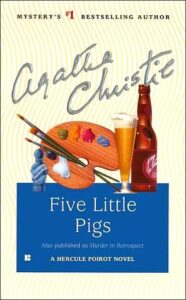 I’m sure it will surprise a lot of you to know that a girl who’s always been book mad had never, until about six months ago, picked up any books by Agatha Christie.
I’m sure it will surprise a lot of you to know that a girl who’s always been book mad had never, until about six months ago, picked up any books by Agatha Christie.
I’ve read a lot of Golden Age crime fiction – my favorite is Dorothy L. Sayers, but I love Margery Allingham and Josephine Tey too. Even more puzzling, I’ve long loved the TV adaptations, particularly the ones featuring David Suchet as Hercule Poirot (I even wrote a Favorite Things about them: https://annacampbell.com/my-favorite-things/2014-2/february-2014-its-no-mystery/).
Over the last six months, that’s well and truly changed. I’ve read a stack of these wonderful stories – and the great thing is Dame Agatha was so prolific that I’ve got an even higher stack still to get through.
With someone who wrote so much over such a long time, there are obviously books that particularly take my fancy and books that I don’t like so much (I have to say the Tommy and Tuppence ones aren’t my particular cup of tea), but when she’s on the top of her game, Dame Agatha is astonishing.
I can see why she’s listed in the Guinness Book of Records as the world’s bestselling novelist. She has such storytelling gifts, you can hardly put the books down once you start them.
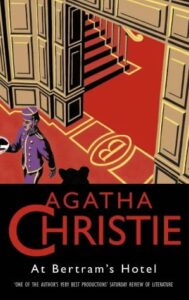 So I’ve picked five favorites out of the many I’ve read recently to share with you today. One of the fun things about reading the Christies is that everyone you meet has their choices for their particular favorites, and you can have endless fun discussions about why you like one book over another. It’s a bit like talking to another Georgette Heyer afficionado!
So I’ve picked five favorites out of the many I’ve read recently to share with you today. One of the fun things about reading the Christies is that everyone you meet has their choices for their particular favorites, and you can have endless fun discussions about why you like one book over another. It’s a bit like talking to another Georgette Heyer afficionado!
My first choice, Five Little Pigs, was published in 1942 and explores a theme that appears often in Christie’s work – passionate love twisted out of shape because of human evil and the force of circumstance, with murder as the result. As a romance writer, I love this trope in her work, and I think she has a real insight into obsession and the fine line between hatred and love.
In this book, 16 years after Caroline Crale hangs for the murder of her husband, a famous artist, the Crales’ daughter approaches Hercule Poirot and asks him to investigate what really happened on that hot summer day so long ago. There’s thwarted passions galore in this one, and they lend the story a powerful charge that is unforgettable.
My second choice is a Miss Marple – I have to say in general my preference is leaning toward the Miss Marple stories over the Poirot ones. There’s a psychological subtlety in the Marple stories that not many of the Poirot ones achieve (although my two Poirots here certainly vie for the crown when it comes to an understanding of the human heart).
At Bertram’s Hotel, published in 1965, is also the most recent book listed today. Some of the stories in the 1960s and 1970s seem more concerned about long-haired layabouts than with creating a great mystery tale!
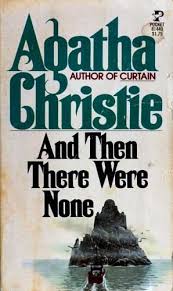
In this one, Christie’s aged spinster heroine turns her razor-sharp brain to the problem of a hotel in London that matches her memories of her girlhood visits too perfectly. Something’s not right and Miss Marple will find it out – and in the process unravel the string of crimes that have baffled Scotland Yard, not to mention solve a murder that promises to be the perfect crime.
Again, thwarted, twisted, misshapen love lies at the heart of this story. One of the things I love about AC’s take on this theme is that she’s brave enough to make a lot of the criminals sympathetic (at least for murder number one – by the time they’re committing later murders, they’ve moved beyond any excuses).
Third is an all-time classic and the book that apparently was Agatha Christie’s personal favorite out of her works. And Then There Were None (1939) isn’t part of a series, but it uses a lot of Christie’s favorite tropes – the disparate crowd of people who know there’s a murderer in their midst as they’re trapped together in one place; the irrevocable workings of fate; a justice that reaches beyond mere law; oh, and don’t forget ruined love. By the way, don’t you love that vintage cover?
Ten strangers are brought to a rocky island off the Devon coast under various pretexts and stranded there in a mysterious house. One by one, they die – surely the last person alive must be the murderer. Well, you’d think so, wouldn’t you? This one’s seriously creepy, and the solution is utterly brilliant.
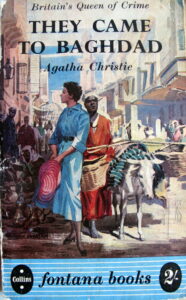 My fourth choice is one I just finished this week. It’s considerably lighter than anything else on my list, but it’s just such fun, I couldn’t leave it out. It’s also more an espionage thriller than a murder mystery, although there are a couple of deaths along the way.
My fourth choice is one I just finished this week. It’s considerably lighter than anything else on my list, but it’s just such fun, I couldn’t leave it out. It’s also more an espionage thriller than a murder mystery, although there are a couple of deaths along the way.
They Came to Baghdad (1951) features a really appealing heroine in plucky, inventive Victoria Jones who happens to be an accomplished liar. When she falls under the spell of a handsome ex-fighter pilot in London, she finagles her way to Baghdad in pursuit of him and finds herself in the thick of secret messages and British agents and a wicked plot to take over the world.
One of the many things that enlivens this sparkling tale is Dame Agatha’s obvious familiarity with her setting. You can nearly hear the camels groan and smell the spices from the souks, it’s all so real. And there’s some wonderful archeological skullduggery going on as well. Definitely not creepy, although there are a few suspenseful moments, but worth a read if you want something light and entertaining, with a very clever denouement.
Last of my famous five, to mix my author metaphors, is my favorite of the lot and surprisingly, it’s a Poirot.
Death on the Nile was published in 1937 so it’s the oldest of my choices and it really takes that theme of a love that demands more than most people are equal to, and runs with it all the way to Egypt. There’s a doomed love affair at the heart of this story that just wrenches your heart. And you can tell Poirot is torn about what’s going on too.
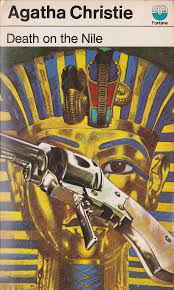 He’s a bit of a Cassandra in this one – he spends the first half of the book doing his best to warn the protagonists in the romantic drama that their actions are sure to lead to tragedy. And of course, he’s right (mind you, Poirot is always right!).
He’s a bit of a Cassandra in this one – he spends the first half of the book doing his best to warn the protagonists in the romantic drama that their actions are sure to lead to tragedy. And of course, he’s right (mind you, Poirot is always right!).
There’s a depth of emotion in this story that shifts it from an enjoyable murder mystery to something much more profound, I think. And her use of setting is absolutely superb.
Obviously as a writer myself, I’ve spent a lot of my time trying to work out just what her secret is. I think she has a God-given gift for storytelling. You really want to know what happens and she never overstays her welcome. The writing is easy to read so the books slip down like a nice cool cocktail on a hot day.
The characters are fascinating in all their flaws and qualities too – you really care about a lot of these people. And that is interesting as mainly we view these people from the outside. There aren’t long descriptions of inner emotional life. You tend to judge people on their actions and what they say, not what you know of their soul. You get enough internal monologue to know them and then off Agatha Christie goes, galloping to the twist at the ending.
I also think that while the reading is easy, the dilemmas she deals with aren’t. We get a great panorama of the things that inspire people to heroism or condemn them to villainy.
I’m a great mystery fan, as many of you know from reading these favorite things columns. But I have to say what I like best in a mystery is a cast of fascinating characters and an intriguing setting. I enjoy the puzzle of whodunit, but it’s not the most important part of the story for me. I think whatever type of mystery reader you are, you’ll find something to keep you happy in the works of Dame Agatha Christie.
Now, I’m off to read my next one…
